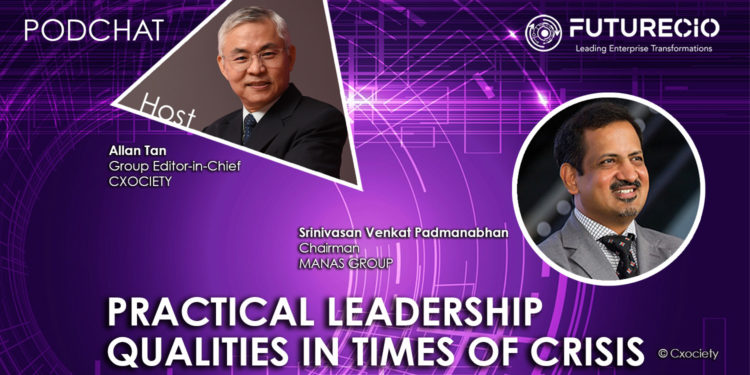According to John F. Kennedy, the 35th U.S. president, the word 'crisis' in written Chinese comprises two brush strokes: one representing danger and the other opportunity.
The past two years have proven that humans will adapt to the changes to survive, and in many cases thrive. Businesses that refuse to adapt will naturally suffer the most and longest during the crisis. Those able to pivot quickly will realise new opportunities await them. Indeed, the pandemic has proven to be an opportunity as much as a struggle for survival. Mergers & Acquisitions, for example, are at an all-time high.
Of course, when you are dealing with something, there will be resistance as there will be circumstances requiring you to test new ideas. Not every situation has a proven methodology for tackling it. Sometimes, you will have to try out an idea if it works, or doesn’t, for the condition in front of us.
The need for connection

Srinivasan Venkat Padmanabhan, chairman of the Manas Group, looked back at the time prior to the COVID-19 pandemic, describing it as a period when physical travel was a requisite of good business practice. “We used to travel, go to several locations, visit people and be inspiring and motivating.”
COVID-19, of course, changed the rules of business engagement. Padmanabhan conceded business travel has been severely disrupted since the start of the pandemic.
Despite the cut in travel, however, he also acknowledged that (some) businesses are doing well and growing under the pandemic circumstances. He also observed the acceleration of digital transformation initiatives, something that would “have taken longer to plan and execute if COVID was not around,” he quipped.
Leadership qualities that stood out in 2020
The Merriam-Webster dictionary defines empathy as “the action of understanding, being aware of, being sensitive to, and vicariously experiencing the feelings, thoughts, and experience of another of either the past or present without having the feelings, thoughts, and experience fully communicated in an objectively explicit manner.”
For Padmanabhan, empathy stood to be a defining quality of leaders during the period of crisis.
“The pandemic has hit us differently and quite hard for some. Connecting to people on an emotional and personal level gives them the assurance that we are there for them and help understand their situation better,” he continued.
He acknowledged that not everyone comes from the same social status, but the pandemic did put everyone on the same playing field. “We are not made that way but the situation has made us become much more emotionally connected to people and that is what creates a lasting relationship. People can rise to location and able to deliver,” he added.
With empathy came the ability to naturally connect with others. Padmanabhan noted that in the past, connections were built and measured in transactions made. One’s value was measured in his or her ability to contribute to the revenue of the business.
Today, the connection is measured by how people connect with each other in non-business terms. “That means do not go on a transactional basis but get to know them as individuals and their current state including family,” he added.
For Padmanabhan, the third quality that rose from the pandemic is business agility. The disruptions during the pandemic strained the financial resources of many companies. It forced many to inculcate agile methodologies in how they manage their finances.
He cautioned that customers and suppliers are likely facing similar financial difficulties and therefore being mindful of their situation can help strengthen relationships in the long term.
What’s expected of leaders in 2022
Padmanabhan believes that every person, company, and its leaders have the capability to overcome obstacles. “Business agility has significantly improved so businesses are able to transform or turn around much faster. We have also entered the digital world and will remain even after the world opens that will provide us with many business opportunities,” he opined.
In a way, COVID has prepared people for the potential difficulties ahead. He posited that business agility has significantly improved because of the crisis of the past two years. It forced businesses to focus and transform faster. It also created what Padmanabhan called a global village – one where people and businesses can operate from anywhere.
“We have developed new skill sets for dealing with people without even having to require the warmth of handshake, or eye to eye contact and hugs or lunch together. There is almost nothing that we cannot do today,” he added.
He further added that the digital world has opened fantastic new opportunities to build on it. There are a lot of new business opportunities coming up in which you thought the physical world will have restrictions and constraints, but this transformed digital world gives you many latent assets and business opportunities.
Click on the podchat player to listen in detail to Padmanabhan’s views on how leadership is evolving in the post-pandemic era.
- Describe for us how leaders behaved prior to the pandemic
- What do you think are the 3 most significant qualities that stood out in 2020 and even pivot the business moving forward and where we are today?
- What are your expectations for this year and the years to come in terms of what business leaders are expected of?
- What are your aspirations for 2022?




